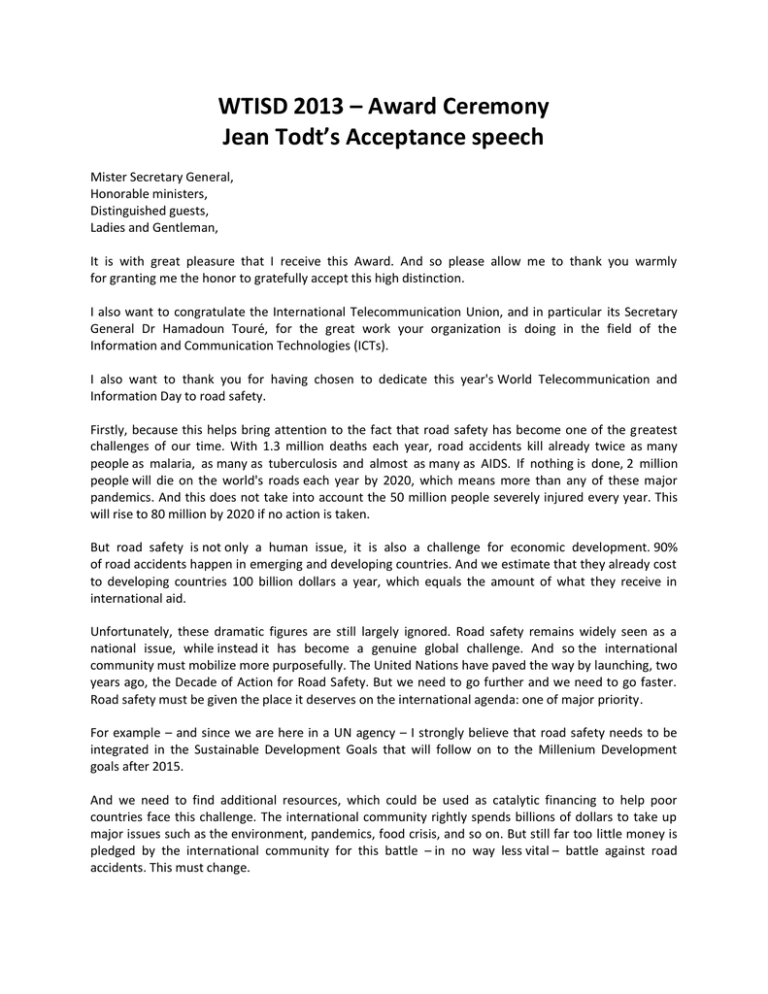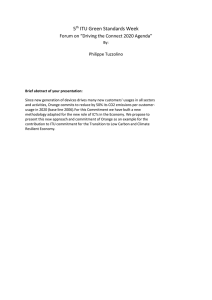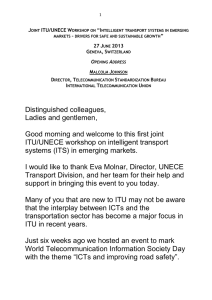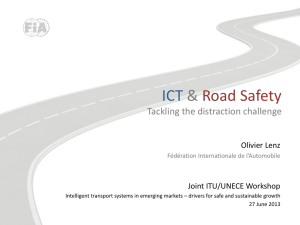WTISD 2013 – Award Ceremony Jean Todt’s Acceptance speech
advertisement

WTISD 2013 – Award Ceremony Jean Todt’s Acceptance speech Mister Secretary General, Honorable ministers, Distinguished guests, Ladies and Gentleman, It is with great pleasure that I receive this Award. And so please allow me to thank you warmly for granting me the honor to gratefully accept this high distinction. I also want to congratulate the International Telecommunication Union, and in particular its Secretary General Dr Hamadoun Touré, for the great work your organization is doing in the field of the Information and Communication Technologies (ICTs). I also want to thank you for having chosen to dedicate this year's World Telecommunication and Information Day to road safety. Firstly, because this helps bring attention to the fact that road safety has become one of the greatest challenges of our time. With 1.3 million deaths each year, road accidents kill already twice as many people as malaria, as many as tuberculosis and almost as many as AIDS. If nothing is done, 2 million people will die on the world's roads each year by 2020, which means more than any of these major pandemics. And this does not take into account the 50 million people severely injured every year. This will rise to 80 million by 2020 if no action is taken. But road safety is not only a human issue, it is also a challenge for economic development. 90% of road accidents happen in emerging and developing countries. And we estimate that they already cost to developing countries 100 billion dollars a year, which equals the amount of what they receive in international aid. Unfortunately, these dramatic figures are still largely ignored. Road safety remains widely seen as a national issue, while instead it has become a genuine global challenge. And so the international community must mobilize more purposefully. The United Nations have paved the way by launching, two years ago, the Decade of Action for Road Safety. But we need to go further and we need to go faster. Road safety must be given the place it deserves on the international agenda: one of major priority. For example – and since we are here in a UN agency – I strongly believe that road safety needs to be integrated in the Sustainable Development Goals that will follow on to the Millenium Development goals after 2015. And we need to find additional resources, which could be used as catalytic financing to help poor countries face this challenge. The international community rightly spends billions of dollars to take up major issues such as the environment, pandemics, food crisis, and so on. But still far too little money is pledged by the international community for this battle – in no way less vital – battle against road accidents. This must change. Yes, road accidents are one of the greatest – and one of the fastest growing – problems of our time. This is why the FIA and myself are so committed. And this is why it is so important that such a respected and legitimate organization as ITU has decided to dedicate its annual event to road safety. Having chosen road safety for this year’s Telecommunication and Information Day also makes a lot of sense. Because yes, technologies can play an irreplaceable role in road safety. As President of “eSafety Aware”, an organization which promotes smart vehicles and new safety technologies, I strongly believe that ICTs can make an incredible difference in road safety. Over the past 10-15 years, vehicles’ safety has already improved a lot, thanks to enhanced crash test standards, crumple zones, air bags and so on. Now a new generation of safety system, often based on ICT’s, can even prevent accidents from happening in the first place. Intelligent vehicle technologies are making cars safer than ever before. Applications such as Electronic Stability Control, Warning and Emergency Braking System Lane Support System, Blind Spot Monitoring, Adaptative Headlights and of course Speed Alert can help avoid thousands and thousands of accidents, and save thousands and thousands of lives. Let me give you just one figure: for the European Union alone, it is estimated that if all cars used Electronic Stability Control, at least 4,000 lives a year could be saved and 100,000 injuries avoided. 4,000 lives, it’s 10% of the 40,000 deaths on European roads every year. In the near future, we will probably go even further in the way car communicate with their environment, either though “car-to-car communication” or through “car-to-infrastructure communication”. But what is still lacking is awareness among both policy makers and car users. And so this is another reason why I am very grateful that you decided to highlight this important dimension: the link between ICTs and road safety, which I believe is a very promising route for the future. But road safety and ICTs can also be related in a very different – and much more negative – way. Because the use of electronic items – cellphones, smartphones, and so on – behind the wheel can also be extremely dangerous. It is the whole issue of “distracted driving”, whether it is by being on the phone or by texting. Can you imagine that a recent American study just showed that texting while driving for example, has now replaced drunk driving as the number one cause of teenage deaths on the American roads? This shows you how serious this is. But here again, people don’t realize the danger. There is a serious lack of awareness and we have to work on this. This is why I am glad that, in the context of the partnership that we are announcing today between ITU and the FIA, we are about to launch a global campaign specifically about the dangers of texting and driving. Raising awareness is a first step, but we also have to imagine ways to make these electronic items be as less intrusive as possible. For example, why not work with the phone manufacturers on a “car mode”, the same way we already have a “fly mode”. This would be a first step for responsible drivers who don’t want to be tempted while driving, to decide to not receive calls and not be able to text, for example, while behind the wheel. The next step is also to make progress on man-machine interfaces to make these electronic items as little intrusive as possible. This, as well as surveillance of the drivers’ state of attention, are important developments for the future. In short, as these technologies – both Intelligent Transport System and Board Drivers Aide - are more and more integrated, what we want is to progress towards a vehicle that communicates more with the external environment and that communicates better with the driver. And so these are other subjects on which we, ITU and FIA, will work together in the future. And this is why we – with Dr Touré – will launch this great partnership between ITU and the FIA. Again, I want to thank ITU and Secretary General Touré for the great honor you are making me today with this Award. Today, the FIA and myself, we feel stronger, because we know that with you, we now have a great ally and a great friend in this crucial battle for road safety. Thank you very much.


